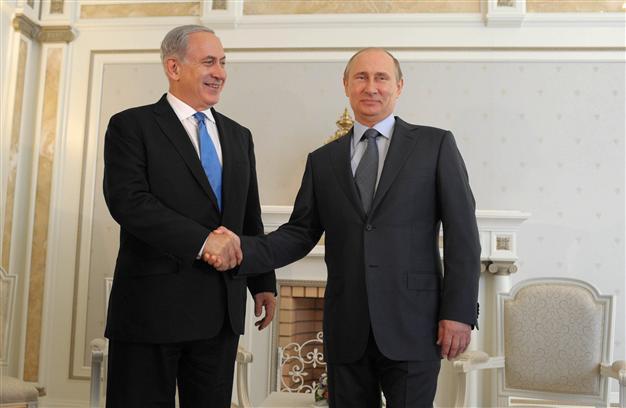Putin warns against moves that could 'shake' Syria
MOSCOW - Agence France-Presse

Russia's President Vladimir Putin (R) and Israeli Prime Minister Benjamin Netanyahu shake hands during their meeting at Putin's residence in the Black Sea resort of Sochi, on May 14, 2013. AFP Photo
Russian President Vladimir Putin on Tuesday warned against any moves that would further destabilise the situation in Syria, speaking after talks with visiting Israeli Prime Minister Benjamin Netanyahu."In this crucial period it is especially important to avoid any moves that can shake the situation," Putin was quoted as saying by news agencies, days after Israeli forces launched air strikes against regime targets in Syria.
Netanyahu had been expected to warn Putin against delivering advanced S-300 missiles to Syria which would severely complicate any future air attacks against the regime of Syrian President Bashar al-Assad. Netanyahu in his public comments did not indicate whether he succeeded in convincing Putin to halt arms supplies to Syria or whether the two leaders reached any firm agreements. Speaking to reporters, Netanyahu stressed that his country's task was to "defend its citizens." "Together we are trying to find ways to strengthen stability and security, we have a remarkable opportunity to directly speak with each other," the Israeli premier was quoted as saying by Russian news agencies.
Russia has refused to halt arms supplies to the Damascus regime, saying it has to honour contracts it concluded before the war.
"I certainly expect to speak with you about the situation in the region, including around Syria," Putin told Netanyahu at the start of the talks at the Russian leader's Black Sea residence in Sochi.
"Together we can think about how to make it (the Middle East region) more secure and stable," Netanyahu replied in televised remarks.
Netanyahu is just the latest world leader to beat a path to Putin's door for talks on Syria in recent days, after US Secretary of State John Kerry and British Prime Minister David Cameron met the Russian strongman last week.
In the wake of the talks with Netanyahu at Putin's vacation residence in the southern resort of Sochi, UN Secretary General Ban Ki-moon is also due to travel to Russia later this week.
The West and Russia have been repeatedly at odds over the Syria conflict, with the United States and Europe accusing Moscow of seeking to prop up President Bashar al-Assad and supplying his regime with military hardware.
The flurry of diplomatic activity indicates some hope on the part of the West that Russia could be persuaded to soften its line over a conflict that according to activists has now killed at least 80,000 people.
The West has long sought to get Russia on board over Syria, trying to win the Kremlin's support by alternately cajoling and berating it.
Cameron said on Monday after talks with US President Barack Obama that London and Moscow had found "common ground" on the crisis.
Obama was more cautious however, saying that there "remains lingering suspicions between Russia and other members of the G8 and or the West".
The US leader added that Russia as a G8 member had an "interest as well as an obligation" to help end the violence.
The West and Israel are particularly concerned about Russia's refusal to rule out further deliveries to Syria of advanced S-300 missile batteries under an existing contract.
Netanyahu has been expected to emphatically warn Putin against delivering such weaponry which would severely complicate any future air attacks against the Assad regime.
Putin has over the last years worked to improve relations with Israel, which is now home to a large Russian-speaking community, after tetchy ties in the Soviet-era when Moscow was perceived as staunchly pro-Arab.
The issues to be discussed have some parallels to a trip Netanyahu made to Moscow in September 2009 for Kremlin talks deemed so sensitive that the visit was kept secret at the time.
According to Israeli media, Netanyahu is believed on that trip to have raised fears about a Russian plan to deliver S-300s to Iran that Moscow decided in the end not to fulfil.
Viktor Kremenyuk, deputy director of the USA and Canada Institute, suggested that Netanyahu during the current trip would warn Putin that Israeli airforce would target the S-300s should the Kremlin decide to deliver the arms to Syria.
"Indirectly, he is letting him know that Israel would destroy the S-300 when they get delivered and start being assembled," he told AFP ahead of the meeting.
Russian Foreign Minister Sergei Lavrov said last week that Moscow was "completing" supplies of equipment to Syria agreed under previous contracts.
According to the Wall Street Journal, citing an Israeli intelligence report, the 2010 contract with Syria includes six launchers and 144 missiles, each with a range of 125 miles (200 kilometres).
Particular hope has focussed on the agreement between Russia and the United States to work to convene a peace conference on Syria.
The conference is likely to be held in early June and not this month as the US works to bring the different sides together, State Department spokeswoman Jen Psaki said Monday.
The latest international push to try to find an end to the slaughter in Syria comes as the war is taking a turn for the worse.
A gruesome video surfaced earlier in which a Syrian rebel fighter is shown cutting out the heart of a regime soldier and eating it.
















